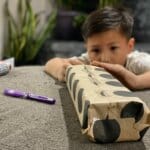






Play Is Not a Stupid Waste of Time
We’re heading into two weeks (or possibly…two months? two years?) of the kids at home. It’s called Christmas Break, as if it’s a break from learning.
But that’s just our Puritan Work Ethic talking — the idea that if something is fun, it is a pause from our real job, which is to always be hard at work on something tough, unpleasant or boring.
We sure are hard on ourselves. And our kids.
So try this little thought experiment: Think back on the time you spent “just playing” as a child. Did you get anything out of it?
The social-emotional skills kids get through play
Psychologists and pediatricians say it is in free play – play that isn’t for a coach or a trophy, play where kids come up with something to do and then do it, without adult direction – that they learn:
Cooperation
Creativity
Communication
Leadership
Empathy
How to “read” someone
How to get buy-in
Frustration tolerance
Self-control
Focus
And…fun.
In fact, play is SO fun that kids will work on those critically important skills (the self-control, focus, etc.), just so they can HAVE fun. Building those skills is a means to an end.
Kids are born to play
In fact, Mother Nature installed the “play drive” for the same reason she installed that other drive – the drive to reproduce: BOTH are critical for the species to continue.
(In fact, play makes you into the kind of person someone would want to reproduce WITH.)
Without play?
Well…left turn here: Think of Yellowstone National Park for a sec. As Playworks founder Jill Vialet explained to Let Grow, about 100 years ago, Park Rangers killed off all of Yellowstone’s gray wolves, because they were preying on the cattle allowed to graze there.
But without the wolves, the elk and deer population exploded and the entire ecosystem collapsed. Plants and animals, even bugs were dying off. Scientists finally figured out that gray wolves are a “keystone species.” Without them, the whole system falls apart.
All work and no play makes Jack a dull, depressed and socially stunted boy
Play is the keystone species of childhood. Without enough of it kids get anxious, out of shape, depressed, lonely, bored, desperate, and dumb. In play, their minds have to be always-on, nimble. Think of how much planning and self-control goes into a game of hide-and-go-seek. It’s like a master class in strategic thinking.
So play is not the opposite of learning. It is learning all the stuff you NEED to SUCCEED.
Christmas break is a chance for kids to catch up on these “other” lessons. And I’ll bet you’ve got some cardboard boxes they can use for homework.
P.S. Here is what Let Grow Co-Founder Peter Gray writes about play (in case you need a heavyweight weighing in!):
Perhaps the most important function of the culture of childhood is to teach children how to get along with peers. Children practice that constantly in social play. To play with another person, you must pay attention to the other person’s needs, not just your own, or the other person will quit. You must overcome narcissism. You must learn to share. You must learn to negotiate in ways that respect the other person’s ideas, not just yours. You must learn how to assert your needs and desires while at the same time understanding and trying to meet the needs and desires of your playmate. This may be the most important of all skills that human beings must learn for a successful life. Without this ability it is not possible to have a happy marriage, true friends, or cooperative work partners.



Comments are closed for this article.